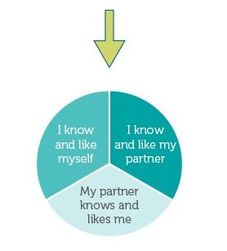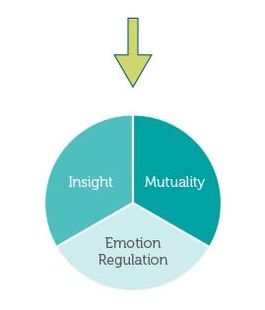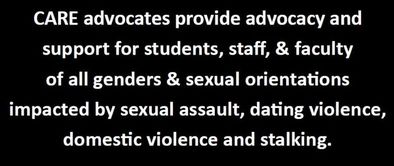Good romantic partners help you to feel significant, loved, and cared for, and help you to feel confident, take risks, and feel supported.
Students often wonder about how to establish a solid foundation in a romantic relationship and communicate effectively with one another. Sometimes they struggle in deciding whether a romantic relationship is good for them or whether it perhaps would be better if it ended.
Check out information below to better understand the qualities of a healthy romantic relationship, gain insights into how to effectively communicate, and make decisions that are healthy for you.
Creating the Foundation for a Healthy Romantic Relationship
|
|
Resolving Conflict & Making ChangesEven in good romantic relationships partners can have difficulties communicating with one another, they can argue and hurt one another, and/or grow distant.
When you feel upset with or hurt by your partner it can sometimes be difficult to resolve those feelings and mend your relationship. And if you're like many people, you might not feel like you have all the tools to make talking it out go smoothly. Check out our strategies for navigating these conversations with greater ease! |
Let's talk About Sex....
Whether you are sexually active or not, physical intimacy is an important part of a healthy romantic relationship. Want to learn how to have a more fulfilling physical relationship with your partner? Topics on this site cover everything from understanding the basics of your and your partner's body, understanding different forms of sexual activity, learning to communicate about each of your values and desires around physical intimacy, practicing sexual health, and more! Don't skip the teen corner either...there are important insights for a healthy sexual self here for people of all ages.
|
Dating & Domestic Violence
Sometimes in dating relationships partners will endure emotional, physical, or sexual abuse from their partner. These behaviors are used to establish power and control over the person and can happen regardless of a person's gender, race, ability status, or any other identity. You have the right to be treated with respect and care in your relationship. Read below to affirm your rights in your relationship and learn more about the red flags that indicate potential interpersonal abuse.
Basic Rights in a RelationshipYou have the right to.....
|
Know The 8 Before It's Too Late1. INTENSITY: Excessive charm, LYING to cover up insecurity, needing to win over your friends and family immediately, OVER THE TOP gestures that seem too much too soon, BOMBARDING you with numerous texts and emails in a short time, behaving obsessively, insisting that you get serious IMMEDIATELY 2. JEALOUSY: Responding IRRATIONALLY when you interact with other people, becoming ANGRY when you speak with the opposite sex, persistently ACCUSING you or flirting/cheating, resenting your time with your friends and family or DEMANDING to know private details of your life 3. CONTROL: Telling how to wear your hair, when to speak or what to think, showing up UNINVITED at your home/school/job, CHECKING your cell phone, emails, Facebook, going through your belonging, following you, sexually coercing you or making you FEEL BAD about yourself 4. ISOLATION: Insisting you only spend time with him or her, making you emotionally or psychologically DEPENDENT, preventing you from seeing your family or friends, or from going to school or work 5. CRITICISM: Calling you overweight, ugly, stupid, or crazy, ridiculing your beliefs, ambitions or friends, telling you he or she is the only one who really cares about you, BRAINWASHING you to feel worthless 6. SABOTAGE: Making you miss work, school, an interview, test or competition by starting a fight, having a MELTDOWN or getting sick, breaking up with you or HIDING your keys, wallet, text books or phone, STEALING your belongings 7. BLAME: Making you feel guilty and responsible for his or her behavior, blaming the world or you for his or her PROBLEMS, emotional manipulation, always saying "This is YOUR fault" 8. ANGER: Overreacting to small problems, frequently losing control, violent OUTBURSTS, having severe mood swings, drinking or partying excessively when upset, making THREATS, picking FIGHTS, having a history of violent behavior and making you feel AFRAID |
Coping After a Break-UpWhether you have chosen to end your relationship or not, the ending can be unsettling and it may take some time before things feel back to normal again. Here are some key strategies to moving on from your relationship with greater understanding of yourself and relationships.
|
|
Proudly powered by Weebly
















